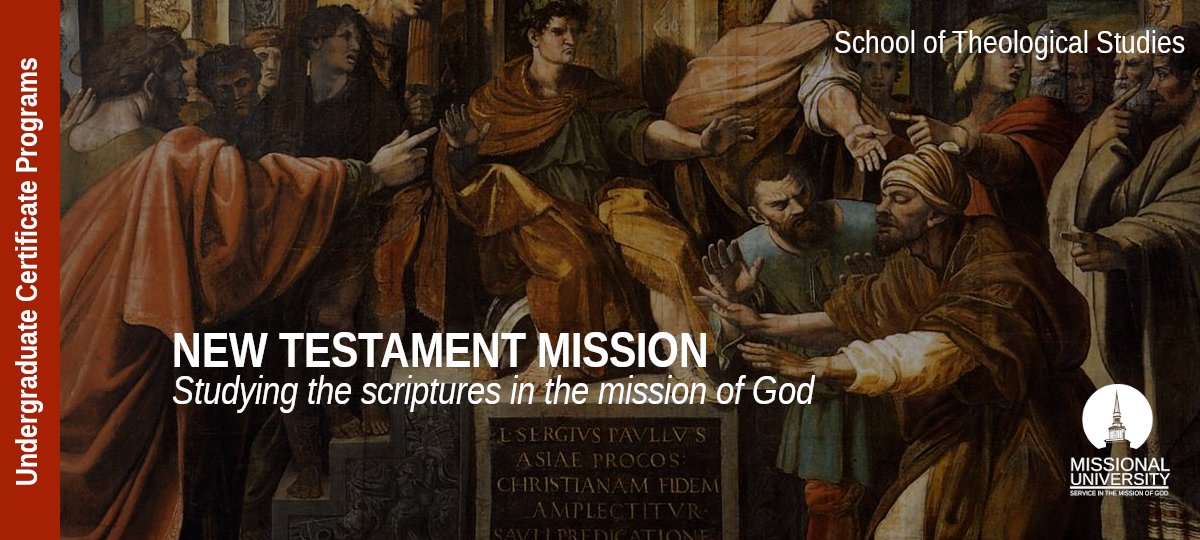
Online Undergraduate Certificate in
New Testament Mission
School: Theological Studies // Study Area: Studying the Biblical Text
☀ Totally Unique Program = only available at Missional University
Expand Your Missional Service Today!
REQUEST INFORMATION
Ready to learn more about the
Undergraduate Certificate in
New Testament Mission?
LEARN MORE NOW
The Undergraduate Certificate in New Testament Mission equips students to interpret the New Testament missionally and create biblically-based missional practices to join the mission of God in neighborhoods, communities, and societies. The courses students take as part of this certificate prepare them to assess ministry approaches in terms of a missional hermeneutic and implement missional approaches that emanate from the biblical text but applied to contemporary multicultural, multiethnic, multireligous settings. By completing this undergraduate certificate, you will gain the following abilities:
-
- Ability to approach the New Testament from a missional perspective while grounding your understanding in first-century cultures, its complex story-like unity with the Old Testament, and its multifaceted witness to the climactic nature of Jesus and his work.
- Ability to articulate the message of Jesus, the training methods he used, how he collaborated with others, how he demonstrated his compassion for individuals and groups, and how he discipled his followers to take the good news to others.
- Abliity to articulate the message and methods of the disciples as they carried out Christian mission in the first century and how they contextualized their approach in light of the unique first-century cultures they faced.
- Ability to articulate the theology of the Apostle Paul through consideration of his role as a missionary and his message, task, methods, tactics and missional goals as he followed the Holy Spirit's direction, financed his missional enterprise, and responded to suffering and urbanized societies.
- Ability to examine key themes in the outworking of the mission of God in areas such as the people of God, suffering and persecution, the shame/dishonour of ancient society and how that influences understanding the biblical text, the believer as pilgrim and resdient aliens and the challenges of submission to authorities and maintaining a courageous witness to the Lord.
- Ability to examine overarching themes of redemption, reconciliation, restoration, renewal and resurrection in light of the theological, economic, social, and ethical implications in the Old and New Testaments and their bearing on ethics and eschatalogy (theological considerations of death, judgment and final destiny of the soul and humankind).
The student who lives missionaly in the world must be biblically grounded. Biblical foundation is established by encountering and engaging the biblical text on its terms. This underscores the need to understand approaches to reading and studying Scripture, its languages, its genres, and its message of redemption. Through the Undergraduate Certificate in New Testament Mission, students learn how to approach the New Testament from a missional perspective and how God's people are to proclaim, enact, and embody the gospel today.
Program Features
-
Integrated practicums allow you to gain valuable real-world experience
-
Learn from academic practitioners from around the world
-
Credits earned in this certificate program can apply to a Missional University Bachelor degree program
Course Effort
Course Length
Credits Required
Program Cost
What Will I Study?
We offer the most comprehensive approach to studying the New Testament in the mission of God.
Did the New Testament give rise to mission or did mission give rise to the New Testament? Many Christians are inclined to think it is the former but the New Testament itself is a product of mission itself. With this in mind, we begin this course by clarifying some key terms (e.g. missional, hermeneutic) before turning to the New Testament documents. Through our study of these and the assessments given the student learns how to approach the New Testament from a missional perspective that appreciates it rootedness and relevance in the first-century cultures, its complex story-like unity with the Old Testament, and its multifaceted witness to the climactic nature of Jesus and his work.
Situates the Gospels within the cultural context of the first-century as we examine Jesus’s mission, including the training methods he used, his collaboration with others, his compassion for individuals and groups, and his mandate for his disciples to take the good news to others, a directive which still has resonance for Christians today at the beginning of the twenty-first century. Students will learn through this course how Jesus went about his mission and how God’s people are to proclaim, enact and embody the gospel.
Focuses on the book of Acts as a witness to the message and methods of the earliest attempts at Christian mission. The goals of the course include discerning what contemporary Christians ought to emulate in modern missional practice. Assessment will include a range of readings, lectures, discussion forums, group projects, and also a descriptive essay.
An examination of Paul’s theology and role as apostolic missionary through a consideration of his message, the task, the methods and tactics he employed, and his missional goals. Particular attention will be paid to the missional intent of Paul’s theology with an emphasis on its Christ-centered and Spirit-powered nature, as well as a consideration of important practical matters, including how he financed his missional enterprise, his response to suffering, and his urban focus.
Examines the outworking of the mission of God via key themes: the people of God are described as pilgrims and sojourners facing suffering and persecution for the name of Jesus Christ and the shame/dishonour of ancient society associated with such affliction. Nevertheless, they are called to respond appropriately by living holy lives in the midst of false teaching and antagonism to the Gospel, persevering in hope and acknowledging God’s sovereignty over all rulers. Particular attention is given to understanding mission in an eschatological perspective, with the church as a body of pilgrims and resident aliens walking a fine line between submission to the authorities and courageous witness to the Lord.
After the Fall, God immediately sets out on a mission of restoring humankind (relationally) and creation (physically) which will one day end in a renewed heavens and renewed earth. With this holistic mission before us and using restoration (e.g., Jubilee) as an overarching principle, we trace its theological, economic, social, and ethical implications in the Old Testament. The theme of Jubilee and restoration is picked up by Jesus (i.e. Luke 4:1-18) with similar underpinnings and holistic thrust, flowing chiefly from the cross-work and resurrection of Christ and issued forth in godly living. Restoration is further traced via the writings of Paul (Rom. 8:18-25), Peter (2 Pet. 2:1-10) and John (Rev.21:1-3) where God’s plan of the restoration and renewal brings an accompanying responsibility for the people of God to behave morally and responsibly. For the authors of the New Testament, and in light of the end-times, ethics and the eschatology are two sides of the same coin.
When Can I Get Started?
We offer multiple start dates each year to give you flexibility in your education, life and work schedules.
JANUARY
MARCH
MAY
AUGUST
OCTOBER
A Career in Joining the Mission of God
Is this Your Mission?
Biblical Studies Blogger, Biblical Studies Editor, Biblical Studies Educator, Biblical Studies Teacher, Biblical Studies Writer, Pastor, Church Planter, Missionary, Missional Community Leader, Pastoral Staff member, Outreach Leader, Church Minister of Mission, Director of Mission, Discipleship Director
Request Information Now
How Much Will it Cost?
We offer tuition based upon country of residence. According to the Human Development Index, all countries around the world fall into one of four categories:
-
(Tier 1) - Very High Human Development
-
(Tier 2) High Human Development
-
(Tier 3) Medium Human Development
-
(Tier 4) Low Human Development
Our tiered global tuition makes higher education affordable for everyone world wide.

TIER COUNTRIES
100% Tuition
$295
per credit hour
3 credit course
$885

TIER COUNTRIES
80% Tuition
$236
per credit hour
3 credit course
$708

TIER COUNTRIES
60% Tuition
$177
per credit hour
3 credit course
$531

TIER COUNTRIES
40% Tuition
$118
per credit hour
3 credit course
$354
Tiered tuition based on country of origin and scholarships available. Find your country of residence here for more information.
Tuition may be further reduced by participating in the Sponsorship Program.
